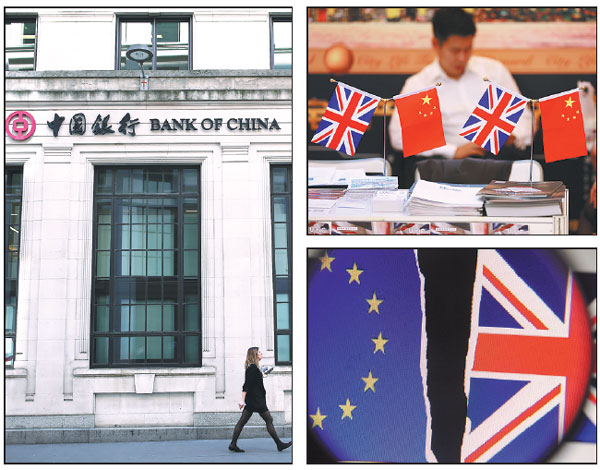What next after the UK vote?
Beyond shock and uncertainty lie potential chances to use Brexit to boost trade and the yuan
Chinese companies will likely adopt a wait-and-watch approach following Friday's startling outcome of the vote on 'Brexit', an abbreviation of the impending "Britain's exit" from the European Union.
They will cautiously weigh their plans for future investments in Britain as the real impact of Brexit remains to be seen, experts said over the weekend.
|
Chinese banks and companies that have a presence in the United Kingdom as a gateway to Europe will feel short-term pain following Friday's vote, but will likely take more time before finalizing their post-Brexit strategy. Provided to China Daily |
Chinese companies that already have a significant presence in Britain, and those intending to use the country as a gateway to continental Europe, will feel immediate pain. For, Brexit is expected to place barriers to their access, increasing their cost of doing business in Europe.
The expected two-year protracted negotiations before Brexit will cast uncertainty over trade and investment talks with the bloc and will, in turn, adversely affect Chinese business, experts said.
"Chinese companies that use Britain to gain access to the EU market will encounter fresh issues including tax, labor mobility and legal aspects. These companies will consider setting up additional offices in the European continent," He Weiwen, a researcher at Chongyang Institute for Financial Studies at Renmin University in Beijing, told Chinese tabloid Global Times.
In recent years, Britain has become the top European destination for Chinese outbound investment. In the United Kingdom, Chinese firms have substantial exposure to several sectors, including infrastructure, real estate, nuclear power and financial services.
Chinese technology firms such as Huawei and Tencent have research and development centers in Britain.
China's overall non-financial direct investment in the UK exceeds $13 billion. The UK is also the second-largest trading partner of China within the EU with two-way trade volume set to reach $100 billion.
Li Ka-shing, business tycoon and Hong Kong's richest man, warned before the vote that he would scale back his investment in the UK should Brexit come to pass as "it would be detrimental to the UK and it will have a negative impact on the whole of Europe".
Wang Jianlin, chairman of Dalian Wanda Group and Asia's richest man with $28.7 billion in wealth as per the latest Forbes list, had also warned he would relocate the European headquarters of his company from the UK to other countries in the event of Brexit.
Chinese experts said Brexit will likely undermine London's position as a premier global financial services hub. This, in turn, would imperil financial linkages between the UK and China as it would put at risk bilateral financial projects under the EU framework.
Gong Zhaoyong, a senior executive at the London branch of China Construction Bank, said Chinese banks may have to renegotiate with the EU as their licensed businesses are registered in the UK.
"Short-term negative impact (of the Brexit vote outcome) on financial markets is a certainty, and it will be in the form of volatility and rising risks," Gong said, noting that it is difficult to say at this point in time what the long-term effect would be.
But Gong said most Chinese companies in the UK have contingency plans ready to face any eventuality.
Analysts are divided on the potential impact of Brexit on the China-UK relations in financial services.
The two countries have agreed to establish a trading link between the Shanghai and London stock exchanges. Before the vote, Chinese policymakers have been keen to make London a major offshore trading hub for the Chinese currency.
Some said Brexit could well jeopardize the internationalization of the renminbi and trigger capital outflows, exerting depreciation pressure on the Chinese currency and complicating the country's monetary policy.
China's stock market will also suffer greater volatility as Brexit would reduce the risk appetite of investors who would shift their money to safer assets such as gold and the US dollar.
The People's Bank of China, the central bank, has already vowed to keep its domestic liquidity reasonable and ample to keep the yuan stable. It has also said it will maintain a prudent monetary policy.
However, some experts believe Brexit will only have a limited effect on China's financial markets and will even likely boost the yuan's status as a global currency.
"The decision may actually accelerate the competition between other European cities for yuan businesses, and, as a result, Britain may have to provide Chinese institutions with better terms," Xiang Songzuo, deputy director of the International Monetary Institute at Renmin University, told Xinhua News Agency.
Lian Ping, chief economist of Bank of Communications, said the status of London as an offshore yuan trading center will be affected, although to what extent remains to be seen. So, this could open up opportunities for yuan business in Frankfurt, Luxembourg or Zurich.
Deng Haiqing, chief economist with JZ Securities Co, a brokerage, said Brexit could be a favorable factor that offers major strategic opportunities for China.
"After exiting the EU, the UK will have to find new markets. Thus, it needs to strengthen the cooperation with countries like China," Deng said.
"It also means the UK, which has broken away from the inefficient decision-making mechanism of the EU, can work more independently and more effectively. And the EU might be forced to improve efficiency as well," he said.
Zhang Xiaomin contributed to the story.
lixiang@chinadaily.com.cn



















